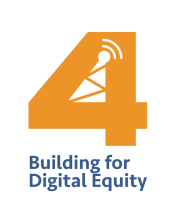Digital Equity Starts in Our Cities and Towns - Episode 565 of the Community Broadband Bits Podcast

This week on the show we're featuring an episode of our new Building for Digital Equity podcast, which looks at how organizations and individuals around the country do work at the intersections of broadband infrastructure, affordability, access, and skills. From frontline specialists helping households sign up for the Affordable Connectivity Program to building small, digital equity-minded ISPs in Arizona, this series showcases the work and lessons from those helping folks get and stay connected in our communities and towns.
On this episode of the podcast, we talk with Brandon Forester - the National Organizer for Internet Rights at Media Justice. Christopher and Brandon talk about helping communities build more agency over how technology shows up in their neighborhoods and among the digital communities they create for themselves. He shares how Media Justice came to prioritize prison phone justice as one of its first issues, what organizing is and how local solutions may differ across communities, and the need to avoid purity politics in doing digital equity work.
This show is 20 minutes long and can be played on this page or using the podcast app of your choice with this feed.
Transcript below.
We want your feedback and suggestions for the show-please e-mail us or leave a comment below.
Listen to other episodes here or see other podcasts from the Institute for Local Self-Reliance here.
Thanks to Joseph McDade for the music. The song is On the Verge and is used per his Free-Use terms.



